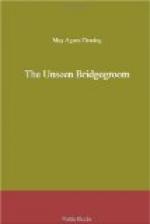“Yes you will for a fair price. Come, name the sum; I’ll pay it.”
Mr. Harkner opened his eyes. Mr. Walraven opened his check-book.
“You do mean it, then?”
“Don’t I look as if I meant it? Quick, I say! If you don’t look sharp I will take her without any price!”
“She’s a priceless treasure!” hiccoughed the manager—“worth her weight in gold to me, and so—”
He named a sum that made even Carl Walraven wince; but he was a great deal too reckless to draw back.
“It is a most cold-blooded extortion,” he said; “but you shall have it. And at your peril you ever interfere with my adopted daughter afterward.”
He signed the check and flung it to the manager, turned and went out, and left that individual staring in blank bewilderment.
Golden-haired Mollie was pacing impatiently up and down the parlor when Mr. Walraven walked in again, his face aglow with triumph.
“It is all right, Mollie. I told you I was more than a match for your manager. You have trod the boards for the last time.”
“Excuse me, Mr. Walraven; I am going to tread the boards again to-night. It is Cricket still. Don’t you want to be enchanted once more?”
“Just as you please. Once is neither here now there. But you will be ready for the eight A.M. train to-morrow, Mollie?”
“I have promised, Mr. Walraven, and I always keep my word. So Mr. Harkner has consented? Now, that is not flattering, is it? What winning ways you must possess to make all the world do as you say!”
Mr. Walraven held up his purse, gold shining through its silken meshes.
“Behold the magic key to every heart, Cricket! Here, you shall be my purse-bearer now.”
He tossed it into her lap. Mollie’s blue eyes sparkled. She was only seventeen, poor child, and she liked money for what money brought.
“I shall leave you now,” Mr. Walraven said, looking at his watch. “Three o’clock, Mollie, and time for rehearsal. I shall go and see Cricket to-night, and to-morrow morning Cricket must be ready to go with me. Until then, my adopted daughter, adieu!”
That night, when the green curtain went up, the strange gentleman sat in the front seat for the second time, and gazed on the antics of Fanchon, the Cricket.
The girl played it well, because she played her own willful, tricky self, and she kissed her taper fingers to the enraptured audience, and felt sorry to think it might be for the last time.
Next morning, as demure as a little nun, in her traveling suit of gray, Miss Cricket took her seat beside her new-made guardian, and was whirled away to New York.
“Pray, what am I to call you?” she asked, as they sat side by side. “Am I to keep at a respectful distance, and say ‘Mr. Walraven,’ or, as I am your adopted daughter, is it to be papa?”
“Well, Cricket, personally I have no objection, of course; but, then, ’papa’—don’t you think ‘papa’ might set people asking questions, now?”




